My life as a game: notes from the tenth Nordic Game Conference
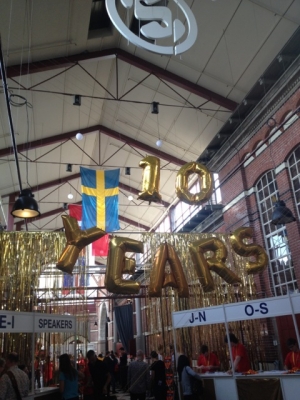 I arrived for once a little early, as the last gold balloons were being lifted into place. I decided to walk the block, attempting to hide my game industry noobiness with some assertive power walking. Ah a river. I will gaze across it with a sense of confidence, a metaphorical eye on the future. All is fine.
I arrived for once a little early, as the last gold balloons were being lifted into place. I decided to walk the block, attempting to hide my game industry noobiness with some assertive power walking. Ah a river. I will gaze across it with a sense of confidence, a metaphorical eye on the future. All is fine.
So as I was scribbling this blog in a cafe in Bristol, the guy opposite told me "I never play video games, not since Duke Nukem in university". And then a few miutes later he mentions playing something on his phone: Words with Friends. He's got four games on the go and plays all the time, but it's not a video game or a copmuter game in his mind, and suddenly it hits me that most of the world with smart phones are playing games - be it Solitaire or Suduko, but many might not even know it. It was a big wake up for me (and I recommend him Ruzzle - a kind of Scrabble meets Candy Crush that I played at the conference from a stand that gave me much needed free socks).
Anyway, back to Malmö, home to the Nordic Game Conference. I was not quite sure how I'd ended up with my pass. I'd been tipped off by a game developer about a free Unity for Storytellers session from Nordic Transmedia that afternoon and after sprinkling the signup form with a few words it had somehow grown into a conference badge, and here I was (thanks Hans and Cecilie!). With the gold balloons bobbing as I returned to the main hall I saw it was the conference's tenth year, just like it was ten years since I was last in Sweden, an experience I've still not quite got over.
Occulus, lucid dreams & the Zuck
So I wonder inside and the first big stand I see is for Oculus, and I watch a man inside what looks like a simulation of a living room with two kids playing a sword fight in front of him. It's a virtual family and in the middle of this slightly cold exhibition space, he's able to pretend he's in a nice home, surrounded by his virtual kids. The guy pulls his headset off looking flustered. 'Try it without headphones on' he's told, but he looks uncomfortable and pulls away. Something about the sight of it all puts me off wanting to have a play. I just want to find him and ask what it was like - but I never get a chance.
 I instead go and play with some nice big Wacom pads as I think about it all. Like many a nerd I've of course been following the Oculus Rift since the initial Kickstarter, and after reading about how players of Oculus were getting lucid and very vivid dreams - even in people who hadn't remembered a dream in years - I became fascinated how this insanely powerful and immersive piece of technology could impact our neurology.
I instead go and play with some nice big Wacom pads as I think about it all. Like many a nerd I've of course been following the Oculus Rift since the initial Kickstarter, and after reading about how players of Oculus were getting lucid and very vivid dreams - even in people who hadn't remembered a dream in years - I became fascinated how this insanely powerful and immersive piece of technology could impact our neurology.
I remember a short film I saw at IDFA a few years back about how virtual reality was being used to treat chronic pain with a form of mindfulness training using virtual environments that responded to breathing. As the 'player' wondered around a virtual space, trees would blow and blossom as their breath slowed, and they calmed down, helping to reinforce the neural pathways that associated being calm and mindful with the 'reward' of a pleasant, blissful environment. VR has also been used quite a lot with post-traumatic stress disorder apparently pretty successfully.
"we're over 40 years after the first commercial arcade game, roughly the same length of time it took cinema to reach its golden age."
But my excitement went flat the night of the Facebook sale, my feelings echoed perfectly by the Nordic video game giant Markus Perrson, who immediately (and eloquently) pulled the Oculus version of Minecraft. It might be easy to think this is just regular-old Facebook hatering - that they're too big, too powerful, too data hungry, too government serving. But the problem is different to that, perhaps bigger. Facebook is at its core an advertisement company, at least in so far as they build their shareholder profits from the sale of adverts, so a new technology, largely unstudied but that impacts cognition and presumably neural pathways - in a deep yet completely unknown way - seems like something that should not be allowed near the ad industry - at the very least until we all understand it quite a lot better.
Why is the Nordic region so good at making games?
A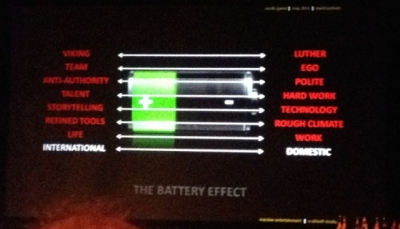 nyway, onto the opening keynote from David Polfeldt of Massive Entertainment, who somewhat ominously was set to tell us why the Nordics are so great at making games (with a reason other than long dark cold winters for coding and gaming). Of course when it comes to video games, the Nordic clans have a somewhat daunting success. From Iceland's Eve Online to Finland's Angry Birds, by way of Copenhagen's game dev platform Unity 3D, Sweden's meth-lab King, makers of Candy Crush and indie king 'Notch' of Mojang, creators of Minecraft. There's giants like Ubisoft, EA Game Label and Massive, and small artist indie outfits like Simogo, Cockroach and Norways's Krillbite - and countless more I feel a bit crap for not listing.
nyway, onto the opening keynote from David Polfeldt of Massive Entertainment, who somewhat ominously was set to tell us why the Nordics are so great at making games (with a reason other than long dark cold winters for coding and gaming). Of course when it comes to video games, the Nordic clans have a somewhat daunting success. From Iceland's Eve Online to Finland's Angry Birds, by way of Copenhagen's game dev platform Unity 3D, Sweden's meth-lab King, makers of Candy Crush and indie king 'Notch' of Mojang, creators of Minecraft. There's giants like Ubisoft, EA Game Label and Massive, and small artist indie outfits like Simogo, Cockroach and Norways's Krillbite - and countless more I feel a bit crap for not listing.
So if this is indeed video game's golden age as some suggest - we're over 40 years after the first commercial arcade game, roughly the same length of time it took cinema to reach its golden age - then the Nordic region is arguably the industry's Hollywood hills - if not financially, at least creatively.
Rather than a jingoistic tubthumping lecture, it turned out to be a fascinating talk, spanning from Jon Ronson to a series of Nordic inventions that are all invaluable but somewhat lacking ostentation (the safety match, the zip, the wrench, the ball-bearing, the drinks carton). What maybe threads through all of these is that while none would start an industrial revolution or encourage people to burn up loads of our planet's resources - they all make life a bit easier or better in some way - and are things we use every day without thinking. He listed the spectrum of Nordic qualities and seven principles, of which a strong human connectedness - seen in 'taking one for the team' and 'self-sacrifice' stood out the most as something rare and clear to see.
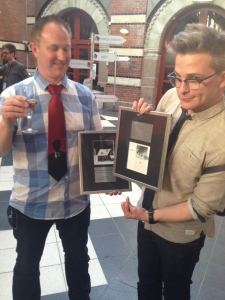 This group dynamic seems well woven and I was touched that - as a newcomer, (total N00b) to the games industry, and an English lad - I was welcomed, be it at the studio of the incredibly talented team from Cockroach eating pizza, talking of Iain M Banks and Polish film posters, watching a preview of the much anticipated next episode of the hand-animated 3D stop motion game Dream Catcher, or acting as award carrier for the two-person Simogo (right), who won both Best Handheld Game and Best Innovation at the Nordic Game Awards.
This group dynamic seems well woven and I was touched that - as a newcomer, (total N00b) to the games industry, and an English lad - I was welcomed, be it at the studio of the incredibly talented team from Cockroach eating pizza, talking of Iain M Banks and Polish film posters, watching a preview of the much anticipated next episode of the hand-animated 3D stop motion game Dream Catcher, or acting as award carrier for the two-person Simogo (right), who won both Best Handheld Game and Best Innovation at the Nordic Game Awards.
Nic, erm, video games?
To the one or two readers of Netribution that may still be out there, you may be wondering why, over a year after my last blog post here - a love song to Cinema - I emerge again with an article on video games - or indeed why mid-Cannes I was at a games conference. Netribution's never really written about video games and this site is now quieter than a Google+ server farm.
The truth is last year I was preparing a new film finance handbook and at the last minute I had a series of thoughts. Firstly that the book couldn't exlcude YouTube makers, who I know next to nothing about. Second that independent TV production seemed to be a place where a lot of money, creativity and audiences were (and my trip to MipDoc/TV this year reinforced that). And finally that with so many new funds for 'transmedia' and this ongoing mashup between film and interactive stories it was pretty hard to ignore video games either. So my crowdfunding campaign stopped after a few weeks of testing. The topic - of funding screen-based visual entertainment - is too big to cover easily. The alternative, of just focusing on feature films - well places like Olffi are already trying to deal with that.

But more than that - indie games seem a pretty exciting place. After watching the Indie Game Movie (one of the most sucessful self-distributed docs around and well worth a watch) - it seemed hard to see much cultrual difference between indie filmmakers and indie game makers - other than the fact games makers can actually make a decent living from it. The artists' drive, that sense of wanting to create an emotional, intellectual or sensory experience which drives filmmakers and screenwriters is just as present at the indie and art side of games. This shouldn't be a big revelation - just as cinema merged theatre/vaudeville and photography, games simply take that and add a further layer of interactivity and personalisation. Playing games like Gone Home and The Stanley Parable over the last year has left me somewhat mesmerised by the creative potential of this fifth axis of interactivity. And of course I don't have so much time to play, and I'm pretty crap at dextrous games, and I'm put off by many aspects of the games world (in Japan there's a genre of stalker/rape games, apparently). But it's a new artform unfolding, and of course I end up somewhat wow doge about it.
Games & Advertising. Achievement unlocked: Bill Hicks
 "I don't want to play a game for free on Facebook VR and spend the next year not quite sure why I keep buying so much Coke Zero."
"I don't want to play a game for free on Facebook VR and spend the next year not quite sure why I keep buying so much Coke Zero."
Wondering further around the conference, I stumble across a game advertising technology company specialising in analysing the game players' emotional mood in order to calculate the exact best moment to sell them something or plant a brand message. Of course to someone offering a free game on a smart phone, the placement of a banner ad can make a big difference to whether they can afford to keep making games or not - it's doubtless helpful to some developers who support the gamers who would never pay for a game. But after all the Oculus and lucid stuff, I end up picturing Bill Hicks turning up at the conference, shouting at everyone and throwing over stands inbetween episodes of hand-vom. Sure, this might be like the early days of cinema - before subliminal messaging was banned. But must we wait for governments - those chaotic, slow and typically ineffectual bodies - to tell us that something shouldn't be done without more research? Can there not be a human moment of intervention when we say our minds are too precious a thing to treat so carelessly, with so little caution to hand over to the ad industry. I don't want to play a game for free on Facebook VR and spend the next year not quite sure why I keep buying so much Coke Zero.
This all reaches a peak on my third day at the conference as I see a child of 5 or 6 being strapped into an Oculus as his mum stood watching. I can't deal with it any more, I feel dizzy and I stumble forward, pushing through the crowds to the exit. This 'build new tech and make money fast then ask questions later' attitude that permeates the VC-led tech world has me ready to leave the conference in a primadonna fury, an arrogant flounce of filmworld superiority. But I bump into someone by mistake, and so stop, a little sheepishly, just before the door by a stand for a Zombie game.
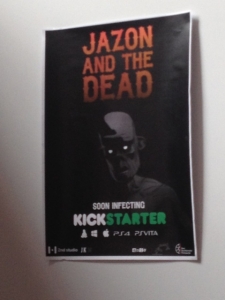 I watch the trailer for a while, it's got a strong aesthetic. The game starts and the main character Jazon is assessing the dead bodies he's slane and there's something about the way he examines them.. The developer of it explains they are trying to make a zombie game as much about the protagonist's emotional reactions to the killing he's done as the killing itself. The two-man team behind it - yet to go to Kickstarter (where $243m has been pledged for over 3,380 games) - want to make a game that makes you reflect on the act of killing, even when it's zombies.
I watch the trailer for a while, it's got a strong aesthetic. The game starts and the main character Jazon is assessing the dead bodies he's slane and there's something about the way he examines them.. The developer of it explains they are trying to make a zombie game as much about the protagonist's emotional reactions to the killing he's done as the killing itself. The two-man team behind it - yet to go to Kickstarter (where $243m has been pledged for over 3,380 games) - want to make a game that makes you reflect on the act of killing, even when it's zombies.
And that said it all, somehow. Like movies that span from the blockbuster mass acts of ugly stereotypes to the greatest works of cinema, TV that ranges from the Wire to 'scripted reality', or music that goes from the cynical pop factories to My Favourite Song Ever - games, like any art, range from the sublime to a kind of cognitive terrorism. From that which expands us a bit - makes us think or feel or sense more - through to that which shrink us, diminishes us into marketing segments, numbers on a shareholder's spreadsheet to better sell us something we probably didn't need.
Oculus's dev relationship guy Callum tried valiantly to reassure me just before the conference closed, in what risked feeling a little like - perhaps for both of us - an end of level boss. Despite @Notch's pulling of Minecraft from the Rift, Callum said he'd not heard one critical voice all conference - making me the lone arsehole. He fairly pointed out that developing and releasing mass-market hardware costs a fortune, and, sure, if they hadn't sold to Facebook it would have been Google who'd have tried to merge it with Glass, or Microsoft, which everyone would have been angry about, or Apple or Valve - "wait Valve?" I say. Surely we'd all have been fine if Oculus had stayed in the hands of an idealistic games company.
But.. my one go on the Rift while I was there for a space shooter, that I ended up just flying around in looking at the stars - left me part wow and part meh. This was not just because of the pixels and the shakiness - but mainly because of the cut out of field of vision of the headset. I couldn't imagine sitting with friends taking it in turn to play. What Hans von Knut at Portaplay is attempting with using the tablet or smart phone as a form of VR interface (hold it to your face if you want - or hold it back to keep your peripheral vision open) - seems much more appealing as it leaves the player with full control over how immersive the experience is. And of course there's lots of other VR projects in the works - be it Sony's Morpheus, a hotly tipped model from Valve and augmented gaming with Google Glasses.
Anyway, I'm giving the wrong impression talking so much about the Rift here. The truth was the conference was brimming with so many brilliant ideas, games and people. Of course, if you get that many bright makers who love to play games together then the outcome should be pretty special - it's surely the main reason why MozFest is so great
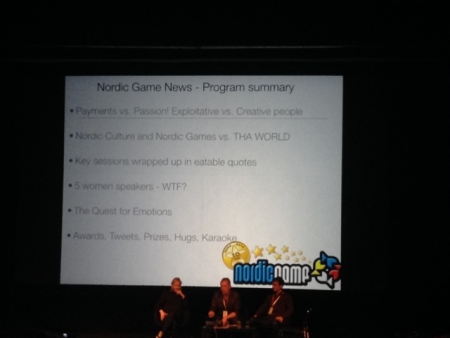
I only saw a fraction of what was on offer, but still got wowed by a presentation done on an overhead projector about probability in card games and Tetris, a musical piece involving two love birds rubbing their giant noses together, talks about game jams and using Unity. I played and quickly died in a gamified physical world version of tig, and was also pwned by the maker of the cool multiplayer game Orbit. The end of conference summary, to the right, summed it all up. Passion vs Payments. Exploitation vs Creativity. The Quest for Emotions. And 5 Women Speakers WTF? Full credit to Erik Robertson and the Nordic Game crew for making such a great event.
Level objectives: The games I need to now go play...
Of the many impressions I was left with, the main one was I need to take some time out to go play some games. I'm not sure when that's going to happen, but topping my list are:
- The Dream Machine
- Year Walk
- Device 6
- Among the Sleep
- 140
- Brothers
- Braid (not Nordic or new, but a bit embarrassing I've not played it yet)
- Future Unfolding.
- else { Heart.break() }
- 20,000 Leagues Above the Sky